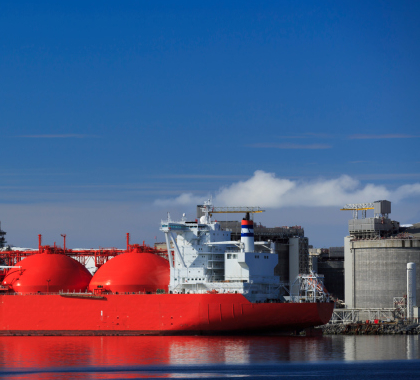The U.S. Court of Appeals for the District of Columbia Circuit has thrown out three lawsuits filed by the environmental activist group the Sierra Club that sought to block the export of liquefied natural gas (LNG) from terminals on the East Coast and the Gulf of Mexico.
The November 1 ruling by a three-judge panel rejected Sierra Club’s argument the U.S. Department of Energy (DOE) failed to give adequate consideration to the potential climate impacts of the export of LNG from the Cove Point plant in Maryland and the Sabine Pass facility in Louisiana and Corpus Christi in Texas.
Climate Effects ‘Speculative’
The Sierra Club had raised three objections to DOE’s decision to approve natural gas exports from the terminals, arguing the department should have conducted an in-depth environmental impact assessment for all three terminals instead of the more narrowly focused environmental assessments for Cove Point and Sabine Pass; DOE’s assessment ignored information about the environmental effects of natural gas production that would feed into Cove Point; and DOE failed to properly weigh the public interest in approving the three projects.
In rejecting the Sierra Club’s arguments, the judicial panel’s four-page decision cited a ruling handed down by a separate panel of the D.C. Circuit in August in which judges rejected similar arguments raised by environmental groups against DOE’s approval of LNG exports from a terminal in Freeport, Texas.
In the Freeport case, the judges pointed out DOE under the administration of then-President Barack Obama and that of President Donald Trump had reasonably argued measuring the effect of LNG exports on greenhouse-gas emissions and climate change was too speculative to inform its decision on LNG terminal expansions and exports. Nothing has changed since the earlier decision, the current judicial panel stated, and therefore DOE is not required to carry out the assessments demanded by Sierra Club, the judges ruled.
‘Pleased but Not Surprised’
The ruling was welcomed by the natural gas industry, according to a statement by Charlie Riedl, executive director of the Center for Liquefied Natural Gas, a coalition of natural gas exploration and production companies, shippers, terminal operators and developers, and energy trade associations.
“We are pleased but not surprised that the D.C. Circuit Court has again upheld DOE, cementing its opinion earlier this year that the existing rigorous DOE review process appropriately considers environmental impacts of these projects,” Riedl said “We hope that today’s decision will put an end to Sierra Club’s unnecessary and costly challenges that delay LNG projects.
“The facts are clear, and the court agrees: The regulatory review process for U.S. LNG projects provides a thorough review of both operational and environmental impacts before being approved,” said Riedl.
Effects of Shale Revolution
Barely a decade ago, dozens of LNG import terminals were being proposed for various locations along the U.S. coast in response to what was then seen as a nationwide natural gas shortage. That all changed when the industry started taking advantage of innovations in hydraulic fracturing (fracking), horizontal drilling, and seismic imaging, which enabled drillers to access natural gas and oil in shale formations. Today, the United States is the world’s largest producer of natural gas.
As a result of the expanded U.S. production, many terminals originally conceived as LNG import facilities have been reengineered to serve as LNG export terminals.
Geopolitical Implications
Jordan McGillis, a policy analyst for the Institute for Energy Research, says environmental activist groups such as Sierra Club ignore the tremendous geopolitical benefits that would accrue to the United States and the free world from increased LNG exports.
“Despite the proven benefits the shale revolution has conferred on Americans, the Sierra Club and its fellow travelers want to prevent other countries from accessing this energy wealth,” said McGillis. “As geopolitics analysts like Leslie Patti-Guzman of Columbia University’s Center for Global Energy Policy have been explaining since our gas renaissance began, the ability to export energy is a valuable foreign policy tool that can help fledgling democracies like those in Eastern Europe to distance themselves from autocratic neighbors and build closer bonds with the West.
“The Sierra Club’s discredited criticisms and myopic assaults on our natural gas industry would deny people around the world the prosperity and energy freedom we in America take for granted,” McGillis said.
Emissions Declining
James Taylor, president of the Spark of Freedom Foundation and a senior fellow of The Heartland Institute, which publishes Environment & Climate News, sees the court’s decision as a win for the environment.
“EPA reports natural gas replacing coal power is the primary reason U.S. greenhouse-gas emissions are in steady decline,” said Taylor. “Exporting natural gas from abundant U.S. supplies would have the same impact on global greenhouse-gas emissions while also benefiting the American economy.
“Nevertheless, the Sierra Club bases its lawsuit on the ridiculous claim exporting LNG will harm the climate.” Taylor said. “The Sierra Club’s hypocrisy knows no bounds.”
Bonner R. Cohen, Ph.D. ([email protected]) is a senior fellow at the National Center for Public Policy Research.





